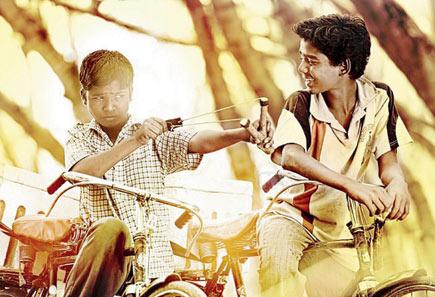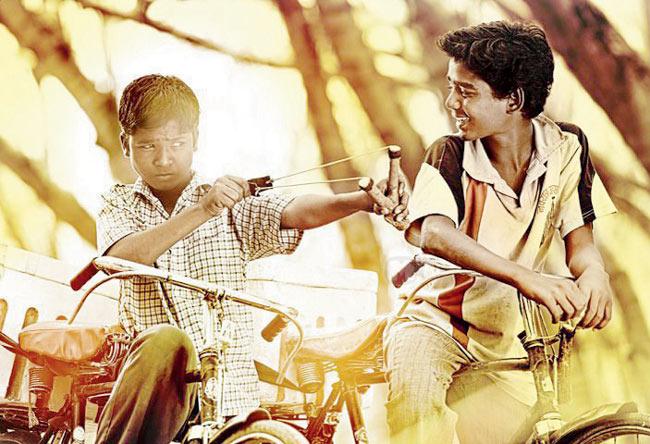The Marathi film Fandry released last Friday in several cities. Find a show in your city. Go see it with your kids

 The Marathi film Fandry released last Friday in several cities. Find a show in your city. Go see it with your kids.
The Marathi film Fandry released last Friday in several cities. Find a show in your city. Go see it with your kids.
ADVERTISEMENT
Sometimes you eat in someone’s home, a simple but excellent meal: each dish precisely flavoured, showing it has been cooked with artistry, respect for the recipe and the process of cooking. The meal may not be flamboyant, nor pander to your habitual tastes. It is made only in the way that household believes in making their food. Yet you come away sated and with a profound feeling of having been treated with regard, by someone who respects themselves.

A still from the film Fandry
I felt this way after watching Fandry. The film tells us the story of a young Dalit boy in a small village; his first love, his aspirations and his reality. The film is sculpted out of anger, yet never lets anger leach the film of the deep tenderness, humour and painful sweetness that suffuses it, doesn’t let tenderness decay into sentimentality, and deploys its intensity with a light, sure artistic hand. The politics and art, the thought and the form, of the film don’t just inform each other, they are each other as they should be.
I don’t think people should see Fandry because it will save cinema, or because this is the next indie revolution or because you will prove you love the country (although all of that might be so!). The film is very composed and doesn’t encourage such clichéd ways of watching.
Good art leaves you with an illuminating idea, a set of questions to reflect on, which may lead us to a new understanding of the world around us.
When Fandry ends, you feel compelled to reflect on caste not as an abstract occurrence, but rather, as an idea that not only imbues our world but in fact shapes it.
Take for instance the world of movies itself. Every now and then we get a well-made coherent film such as Band Baaja Baaraat or Main Hoon Na, but this is hardly the norm. What excuse can films, which have crores spent on them, have for half baked scripts, garbled ideas, incoherent experimentation and acting where the kids of famous folk speak in toy accents — in short what’s the excuse for such casual incompetence which nevertheless earns indulgent praise? Kind of reminds you of how people wah wah the doodles and nursery rhyme recitations of the zamindar’s sons, eh? It’s often about who you are, also called the caste system.
In the credits, I saw the editor of the film was Chandan Arora who has both, directed features himself — Main Madhuri Dixit Banna Chahti Hoon, Striker — and edited films — Krrish 3, Company — that felt unusual and nice. Too often people function through a strange sense of status: now I have directed a film, I cannot edit one. Abhi I have worked on a big movie, so I can’t do a small movie. These are stories not of success but enslavement, to the idea of hierarchy, not filmmaking, storytelling or art. What we make and how we work, both generate the worldview of the work. When we step out of this grid of hierarchy, we humanize others, and ourselves. We show respect for work and audiences and create works of love — whether arthouse or commercial — not arrogance.
Given the many caste systems we all exist in, and allow to exist, it may be a while before the next such film comes along. So go see Fandry, and take your kids, so they may assess their lives with wisdom.
Paromita Vohra is an award-winning Mumbai-based filmmaker, writer and curator working with fiction and non-fiction. Reach her at www.parodevi.com.
The views expressed in this column are the individual’s and don’t represent those of the paper.
 Subscribe today by clicking the link and stay updated with the latest news!" Click here!
Subscribe today by clicking the link and stay updated with the latest news!" Click here!






